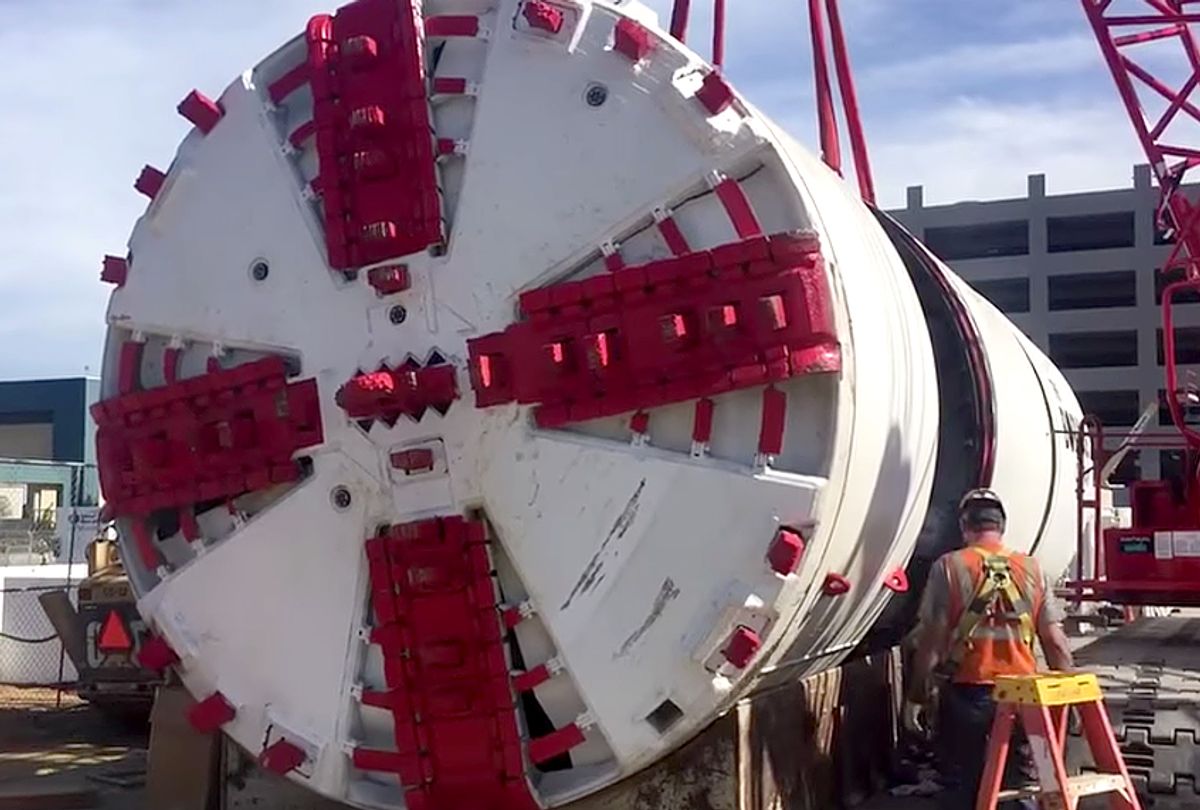Serial entrepreneur Elon Musk’s new tunneling transportation enterprise, the Boring Company, has been selected to build a 12-minute, 18-mile rapid transit connection between Chicago’s O’Hare International Airport and downtown. The contract is a big leap of faith for Musk's two-year-old enterprise, which has received little in the way of real-world contracts.
The Chicago Tribune reported that Musk’s company was chosen from four competing bids to build an underground tunnel that would contain a train that would move people between O’Hare and downtown Chicago. The new system would replace the oft-frustrating L train, which makes the same trip.
According to a video highlighting the technology's concept, the proposed tunnel would house a fully autonomous 16-passenger vehicle that would travel at 100 miles per hour. The cost per ride would be $20 to $25.
Yet Musk’s prototype has yet to be tested in the real world. That makes Chicago Mayor Rahm Emanuel’s decision to go with Musk’s company particularly eyebrow-raising. Indeed, the Emanuel administration’s decision to reward the tunneling contract to the Boring Company constitutes a gamble on an entrepreneur with a reputation for being the consummate hypeman.
Reports that Emanuel was considering Musk for the project date back to last summer. In August 2017, the Chicago Tribune obtained emails under a Freedom of Information Act request that showed Emanuel was having preliminary conversations about the deal with Antonio Gracias, founder of Valor Equity Partners, an investment firm. A Chicago Tribune report found that Valor Equity and/or its owners had donated $7,100 to Emanuel during his third term. Furthermore, the Tribune reports that Gracias is also an investor in Musk's Tesla and SpaceX — though reportedly he has not invested in the Boring Company.
According to the Chicago Tribune:
Gracias said his firm has not invested in Musk's Boring Co. or drilling efforts, and said, "Mr. Musk never asked me to raise the topic with the mayor." It was Emanuel who pitched the idea of Musk pursuing high-speed transportation in Chicago, said Gracias, who with his wife has contributed a total of $22,700 to the mayor's campaign fund.
"The mayor and I were discussing his vision to continue to improve the city. He raised the idea of a direct high speed train to O'Hare as a possibility with me. I then responded that the city should talk to The Boring Co. regarding a tunnel and an electric train or hyperloop," Gracias said in an email response to questions. "My sole motivation was to help him with ideas to improve Chicago."
This deal raises questions about the ways in which Emanuel’s administration skirts ethics rules around contractors and nepotism.
Yet the most perplexing sticking point may well be the overall cost of the contract: less than $1 billion, as the Chicago Tribune reports. The Boring Company offered to foot much of the bill, in return for keeping transit fees and any money made by advertisements. In other words, it’s a public-private partnership, a project ostensibly done in the name of public interest yet in which private companies are entitled to keep the proceeds and monetize the overall system.
Similar civic schemes characterize the political doctrine of neoliberalism, which removes ownership and control of public goods from public hands and places them squarely in private, unaccountable ones. Notably, a majority of Democrats and nearly all Republicans have embraced neoliberalism as the only option for governments in need of public works projects.
An official timeline for the project has not been released, but The Verge spoke with transit experts who said that $1 billion was an unrealistic estimate for construction costs. For comparison, New York City’s Long Island Rail Road Project cost over $3.5 billion per mile; the extension of New York’s 7 train cost around $2 billion per mile. The track from O’Hare to downtown Chicago will run 18 miles.
When asked at a press conference on Thursday what he personally gains from the project, Musk demurred.
“First of all, I should preface this by saying... what I would ask is that... this is a difficult thing that we’re doing. It’s a hard thing. It’s a new thing. And I’d hope that you would cheer us on for this. Because if we succeed, it’s going to be a great thing for the city. And if we fail, well, I guess me and others will lose a bunch of money,” he said.
In Chicago, academics have been raising red flags over the deal.
“This is a stretch. The regulatory process alone could become a bogeyman … and God knows what you’ll find when you start digging through the city. Who knows if there’s gonna be complications like the Big Dig?” said Joe Schwieterman, director of DePaul University’s Chaddick Institute, told the Chicago Sun Times.
“The risk is this becomes a soap opera — a half-finished project looking for a white knight to save the day. The other risk is the demand. It’s not a slam-dunk that business travelers will instantly pull out their credit cards to pay [$25] to ride.”
Dorothy Brown, a Circuit Court clerk, said in a statement via the Chicago Sun Times that the announcement was a “distraction.”
“This announcement — at this time when we have the tragic issue before us about the sexual assault of our children — appears to be more of a distraction and smokescreen,” Brown, a mayoral challenger, said.
Meanwhile, Mayor Emanuel remains confident about the project.
“Bringing Chicago’s economic engines closer together will keep the city on the cutting edge of progress, create thousands of good-paying jobs and strengthen our great city for future generations,” Emanuel said in a statement. “This transformative project will help Chicago write the next chapter in our legacy of innovation and invention.”

Shares